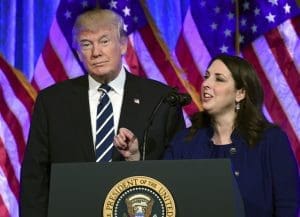GOP says it's Democrats' fault they had to cancel convention in virus hotspot
Republican National Committee chair Ronna McDaniel said she was concerned that Democratic governors ‘would refuse to let our delegates return to their states.’

The chair of the Republican National Committee contradicted Donald Trump’s explanation of why he scrapped his plan to accept his party’s nomination for reelection in Jacksonville, Florida.
While Trump had claimed the cancellation was due to the coronavirus surge in the state, Ronna McDaniel said that the real blame lay with Democratic governors.
In an interview published Wednesday by Real Clear Politics, Ronna McDaniel said she “wasn’t that surprised” Trump canceled his plans to hold the ceremonial portions of the Republican National Convention in person in Florida, given “the spike in coronavirus cases there.”
“And the concern we had [was] with Democratic governors, which we’re starting to see now, that would refuse to let our delegates return to their states or [require] them to quarantine for 14 days,” she said. “It was just not looking like something that could be tenable. We’ve continually seen Democratic governors who use coronavirus to expand their powers.”
But last week, when Trump announced his decision, he framed it as entirely about protecting the American people from further spreading the coronavirus during a pandemic.
“I looked at my team, and I said, ‘The timing for this event is not right. It’s just not right with what’s happened recently — the flare-up in Florida — to have a big convention. It’s not the right time,'” Trump said on Thursday. “It’s really something that, for me — I have to protect the American people. That’s what I’ve always done. That’s what I always will do. That’s what I’m about.”
“I care deeply about the people of Florida and everywhere else, frankly, in this country — and even in the world — who would be coming into the state, and I don’t want to do anything to upset it,” he said.
The Trump campaign did not immediately respond to an inquiry about the apparent contradiction.
Contrary to McDaniel’s claim, it is unlikely that any GOP delegates would have been trapped in Florida. The states that have implemented quarantines for people traveling from COVID-19 hotspots such as Florida are merely requiring that they isolate themselves for two weeks to avoid further spreading the virus, not that they stay out of the state entirely.
And contrary to her assertion that it is only Democratic governors who have implemented quarantine periods, states with Republican governors, such as Massachusetts, New Hampshire, Ohio, and Vermont, have instituted restrictions on people arriving from areas with high levels of community spread.
Indeed, the first governor to institute such a requirement was Florida’s Republican governor, Ron DeSantis, back in March. He required quarantine for anyone coming to the state from New York and its surrounding areas.
“I quarantined them in March. And everyone in New York media was blowing a gasket [asking] ‘How could you do this?'” DeSantis said at a press conference in May. “That was the right decision. … Had we not done the quarantine, you would have had way more cases, hospitalizations, the whole nine yards. I have no doubt that that quarantine saved lives.”
Published with permission of The American Independent Foundation.
Recommended

Biden campaign launches new ad focused on Affordable Care Act
Former President Trump has said he wants to do away with the popular health care law.
By Kim Lyons, Pennsylvania Capital-Star - May 08, 2024
Ohio doctors fear effects of emergency abortion care case set to go before U.S. Supreme Court
A federal law that allows emergency departments to treat patients without regard to their ability to pay will be under U.S. Supreme Court scrutiny this week, and Ohio doctors are concerned about the case’s local impact on emergency abortion care.
By Susan Tebben, Ohio Capital Journal - April 23, 2024
House GOP votes to end flu, whooping cough vaccine rules for foster and adoptive families
A bill to eliminate flu and whooping cough vaccine requirements for adoptive and foster families caring for babies and medically fragile kids is heading to the governor’s desk.
By Anita Wadhwani, Tennessee Lookout - March 26, 2024









































































